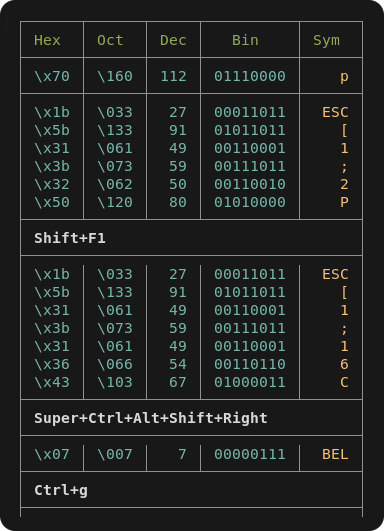By default, keypress runs in interactive mode. In this mode, it generates a byte-by-byte representation of keyboard inputs as the user types, whether for individual keys or key combinations. This representation includes the following formats: hexadecimal, octal, decimal, binary, and the corresponding symbols.
Why? Have you ever developed a terminal program dealing with keyboard input? That is why.
Also, keypress is platform agonostic: it works on the TTY, X11, Wayland, and virtually any terminal emulator.
Awful, useful.
Tip
Copy any text you like (yes, including UTF-8 characters) to the primary clipboard, and then paste it into the keypress interface to get the corresponding raw codes.
Did you know, for example, that printf "\xc3\x9f\n" will print an ß (the german Eszett)?
Try with printf "\xf0\x9f\x98\x80\n". Nice!
By using the -t option, keypress runs in translation mode: it translates a keyboard escape sequence passed as parameter into the corresponding symbolic/text representation. For example:
keypress -t "\x1b[1;7D"This command will output Ctrl+Alt+Left.
Note
For developers: The translation module can be used as an independent library. Simply include the translate_key.h header in your project (together with the corresponding source file) and use the translate_key function.
Here's a quick example:
...
#include "translate_key.h"
...
char str[] = "\x1b[1;7D";
char *keysym = translate_key(str, 0);
if (keysym) {
printf("%s\n", keysym);
free(keysym);
}
...Use the -k option to enable support for the Kitty keyboard protocol. Version 0.2.3 or later required.
To install keypress, follow these steps:
git clone https://github.com/leo-arch/keypress
cd keypress
make
sudo make installTo uninstall keypress, use the following command:
sudo make uninstalllibtermkey - Easy processing of keyboard entry from terminal-based programs
Note
This library is deprecated. Use libtickit instead.
